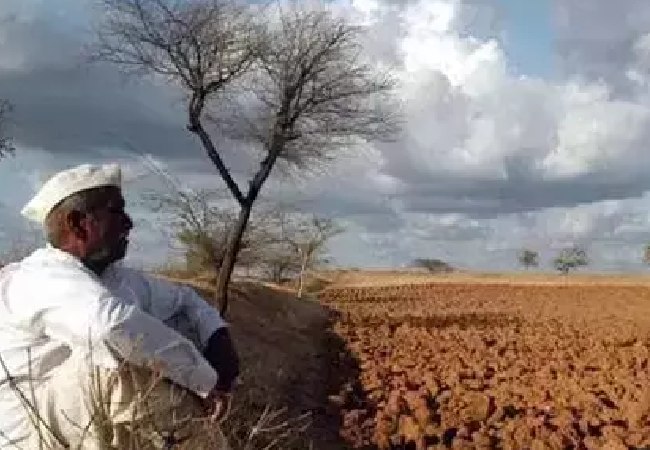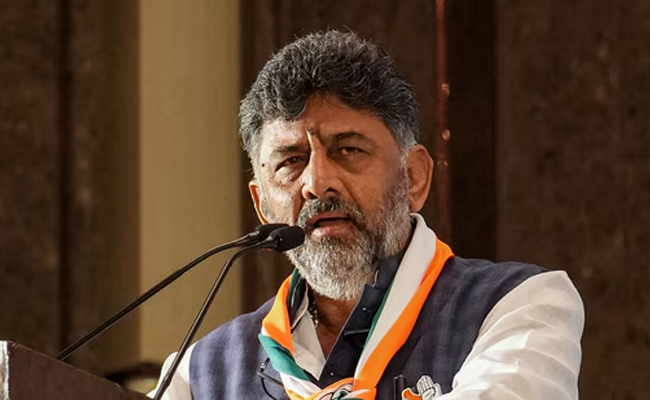Bengaluru, (PTI): The Karnataka cabinet has given its consent to declare 21 more taluks as drought hit, taking the total number of such taluks to 216. As such, it has claimed a total relief of Rs 5,326.87 crore from the Centre, the state's Minister for Law and Parliamentary Affairs H K Patil said on Thursday.
Karnataka has a total of 236 taluks in 31 districts.
"The cabinet today gave its approval to declare 21 more taluks as drought hit. These are in addition to 195 already declared as drought affected. Out of 21 taluks, 10 are facing severe drought," Patil said.
Briefing reporters about the cabinet decisions, he said that the total agricultural and horticultural crop loss in the state due to drought is estimated to be about Rs 33,770 crore, and the state has claimed relief of Rs 4,414 from the Centre for this, as per norms.
"Also, Rs 355 crore has been sought for the loss of livestock, and drinking water relief of Rs 554 crore. So the total relief claimed is Rs 5,326.87 crore," he said.
The minister said the cabinet had also expressed concern over central ministers delaying appointments for state ministers seeking to make requests for relief in person. The chief minister has tasked the revenue minister with visiting Delhi to speed things up, he added.
With an aim at ensuring the delivery of justice at the doorstep of citizens in rural areas, the cabinet has given in-principle clearance to establish 100 rural courts across the state.
The minister said that the village courts would be set up for panchayats or a cluster of panchayats and they will be of the same level as courts of the Judicial Magistrate of First Class.
The Central government will provide a one-time grant of Rs 18 lakh per court and Rs 3.5 lakh as recurring expenditure, he said. A proposal granting Rs 100 crore for this has been cleared by the cabinet. "As per initial estimates, it will cost Rs 25-30 crore crore per year for 100 courts," he added.
The law department and high court will work out the implementation of the system, as judges have to be appointed by them, the minister said, adding that details of where and when these courts will start would be shared at the earliest.
In other decisions, the cabinet has given administrative approval for a Rs 20 crore programme to strengthen and equip 11 police training schools in the state.
In a move aimed at providing Piped Natural Gas (PNG) for domestic, commercial and industrial customers, and Compressed Natural Gas (CNG) for vehicles, the cabinet has given approval to the 'State Policy for the Development of City Gas Distribution Network'.
Sharing the highlights of the policy, Patil said it would promote the adoption of natural gas by the state as a green and clean fuel and ensure faster implementation of City Gas Distribution (CGD) infrastructure.
It would also help city gas distribution entities undertake safe operations and provide reliable uninterrupted supply of natural gas by maintaining the asset.
Permissions and clearances for the city gas distribution entity would also be given in a time-bound manner by providing policy framework and necessary support, as per the policy.
Moreover, it would encourage the use of natural gas for industrial and household purposes as well as commercial transport, which would help India fulfil its commitment to the Conference of the Parties (COP 21) to reduce carbon emissions.
The policy would also encourage city gas distribution entities to develop compressed biogas plants in collaboration with the local bodies in the respective geographical areas, and promote the government's initiative under the Swachh Bharath Abhiyan -- "this will address the issue of waste disposal in the district," he added.
The cabinet has also given post-facto clearance for extending the Gruha Lakshmi scheme, which grants Rs 2,000 monthly assistance to the woman head of every family, to sexual minorities as well.
It has also been decided to continue with the existing system, by providing cash in lieu of the additional five kg of rice to beneficiaries, under the Anna Bhagya scheme.
The cabinet has authorised the Chief Minister to decide on the schedule for calling the legislature session in Belagavi, the minister said.
It has also has given its approval for bringing in an ordinance that will tweak the law on compulsory rural service for doctors.
Till now, everyone who cleared medical exams had to do compulsory rural service. "Now it will be relaxed to the extent of posts available or to the extent of what the government decides...it will now not be mandatory, but the government will select doctors for rural service on merit basis," the minister said, adding that this has been done keeping in mind the unnecessary wastage of human resources.
Let the Truth be known. If you read VB and like VB, please be a VB Supporter and Help us deliver the Truth to one and all.
Gorakhpur (PTI): A hospital employee was booked for allegedly sexually assaulting a woman in the pretext of an ultrasound test here in the district women's hospital, police said on Saturday.
According to the complaint, the woman, a resident of the Gulriha area, visited the district women's hospital on Thursday morning for an ultrasound test.
She was directed to a room, where Abhimanyu Gupta was conducting ultrasounds. When her turn came, the accused allegedly stared at her and told her to remove all her clothes, claiming it was necessary for the test and that a massage would also be required, she said.
ALSO READ: UP: Girl kidnapped, raped multiple times over 25 days; accused held
The woman alleged that once she complied, the accused began making obscene advances and tried to force himself on her. When she screamed, he allegedly gagged her, abused her and threatened to kill her before pushing her out of the room.
She said her complaints within the hospital went unheard, forcing her to approach the police.
Taking cognisance of the complaint, the hospital administration constituted a three-member inquiry committee, officials said.
Senior consultant (paediatrics) Dr Jay Kumar said, "The woman has levelled serious allegations against a staff member. Senior officials have been informed, and a departmental inquiry is underway. Strict action will be taken if the charges are proved."
Kotwali Station House Officer Chatrapal Singh said a case has been registered, and efforts are on to nab the accused.





